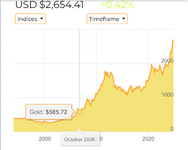I apologise if your ego is somehow deeply invested in the idea that gold is "intrinsically valuable", but seriously, it's futile to be so defensive about your religion; I shall continue to mock it, even if you post insulting but contentless screeds deriding me for doing so.
Wow, bilby! Doubling down on your confusion!
Do you see the sharp downturn beginning about 2013 in the graph Elixir just posted? This is what is meant by a
price correction when intelligent people attempt to communicate with other intelligent people. Now let's look at what YOU wrote, and which provoked my laughter and my attempt to amuse you:
Which makes confidence in the idea that gold will never suffer a correction even more irrational.
And as humans are irrational, probably also correct (at least for any timescale relevant to people currently alive).
You assert, wrongly, that some people (presumably you include me) have confidence that a
price correction will "never" occur. And then go on to assert, again wrongly, that that "irrational" idea is CORRECT.
In other words, the only one here denying the existence of the price correction beginning in 2013 is YOU.
Capische?
[Rant rant rant rant rant.]
Gold is shit for use as money.
[Rant rant rant rant rant.]
Your peculiar claim here is confused on two grounds:
(1) Nobody here, perhaps excepting our Libertarians, speaks of returning to the use of gold as money. Those who advocate keeping a small portion of one's investment portfolio in precious metals, advocate this as a Hedge. Start a new thread if Googling 'Hedge' just confuses you further.
(2) Although "shit" in your opinion, precious metals were used as money for five thousand years. (Yes, that's a '5' followed by three zeroes.) Experiments with paper money failed until
Google summary said:
It was in 1661 that the private bank Stockholm Banco began replacing coins with banknotes, resulting in both Sweden's first banknotes and the world's first banknotes.
Amusingly(?), Sweden adopted paper money because it used, not gold or silver, but bulky copper as its precious-metal money. And the private bank Stockholm Banco pledged to redeem that paper money for copper on demand.
(The claim that the Swedish banknotes were the world's first is misleading. China had used paper money centuries earlier but, despite acceptance as taxes, the paper failed when government reneged on the promise to redeem with precious metals. And letters of credit functioned as a form of money in medieval Europe, successfully so due to the integrity of issuing private banks.)
You might note that this commentary is long on reasons, and short on insults; That should give any third parties reading this a basis for deciding which of us is the crazy one.

My intent was to amuse, not to insult. I thought you would grin and post some punny retraction when I pointed out that YOU are the only one here asserting that an idea (which you correctly call "irrational") was "correct." Instead YOU resort to insults.
Sigh.

 As you yourself point out more than frequently, Central Banks can create unlimited amounts of non-gold money just by pushing electrons around inside a computer. True, there are only several trillion trillion septillion electrons available in the Earth's crust but through clever programming, electrons can be reused! For consistency, I suppose you treat electronic dollars as even more worthless than gold.
As you yourself point out more than frequently, Central Banks can create unlimited amounts of non-gold money just by pushing electrons around inside a computer. True, there are only several trillion trillion septillion electrons available in the Earth's crust but through clever programming, electrons can be reused! For consistency, I suppose you treat electronic dollars as even more worthless than gold. 
